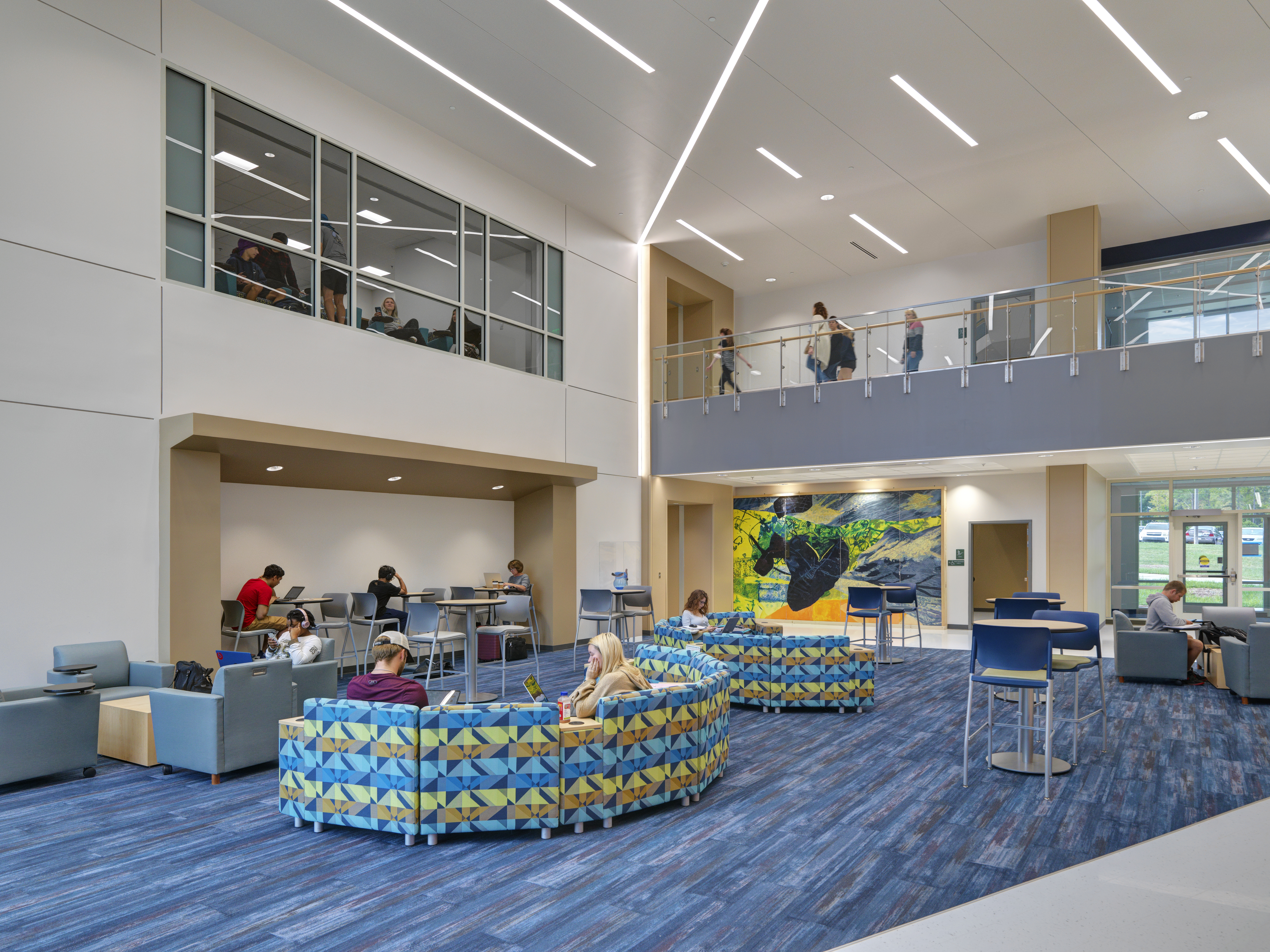The following are the materials from the 2024 NCACCT Law-Legislative Seminar in Raleigh:
The following are the materials from the 2024 NCACCT Law-Legislative Seminar in Raleigh:
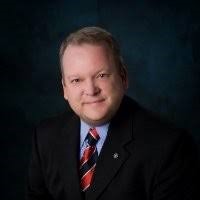
Spotlight on Community College Leaders:
Cleveland Community College Vice Chair Allen Langley
By Ashley Blizzard, NCACCP/NCACCT Coordinator of Operations
Cleveland Community College (CCC) vice chairman Allen Langley is a living testament to his favorite quote: “You haven’t lived until you’ve done something for someone who can never repay you.” With an exceptional dedication to public service, Langley is a shining example of how one person can profoundly impact many.
Langley is CCC’s longest serving trustee, having served now for 10 years. Beyond this role, he is also on the executive board for the NC Association of Community College Trustees (NCACCT), and he has recently been elected to the board for the national Association of Community College Trustees (ACCT).
Langley’s journey as a trustee began when Governor Pat McCrory recognized his dedication and passion to service after hearing him speak at a Rotary Club meeting in 2012. This led McCrory to ask Langley to serve as a Cleveland Community College trustee. Wanting to expand his ability to support young people in their educational and career pursuits, Langley agreed.
Langley and his wife, Mandy, have two daughters, one of whom has completed college and another who is currently attending college. They have gained a firsthand understanding of the challenges associated with the cost of education. Langley’s tenure as a trustee has opened his eyes to financial obstacles like food insecurities and the lack of affordable childcare that many students must overcome to be successful. He says that CCC is working to support its students by addressing these challenges. “I’d like to do more so more people can come onto our campus and not have to worry about where their next meal comes from or who is going to help take care of their child that day,” says Langley.
Langley emphasizes that every community has diverse needs and goals. “We need to be pliable enough to provide what they need. We need to meet them where they are to achieve their goals and objectives,” he says.
According to Langley, the introduction of sports to the CCC campus “has been a real game changer.” The addition of sports has enhanced the campus’s sense of community and has made it feel more like a four-year college. Langley has been proud of this addition to CCC.
In his more recently acquired roles as executive board member of NCACCT and board member of the national ACCT, Langley has gained a broader perspective of community colleges than just at the local level. In speaking about all community colleges, he says, “I’m proud we offer a good, quality service to our clients, which are our students. If we can offer them a chance to be able to better support their families, it makes the whole community a better place.”
Langley imparts valuable advice to incoming trustees. First, he reminds them that that this is an opportunity to affect the future of young people; everything a trustee does makes a difference. Therefore, new trustees must decide what kind of difference they want to make. Second, Langley says, “The students we serve are a whole lot like wet cement. Whatever falls on them leaves an impression. We, as trustees, need to make sure that the impressions we leave on each one of these students are positive ones.”
Beyond community colleges, Langley’s extensive volunteer work includes 36 years and counting as a devoted member of Rotary. Additionally, he is the current chair of the Shelby Parks and Recreation’s Board, the Cleveland County Chamber of Commerce Board and Cleveland County’s largest festival, the Merry-Go-Round Festival. He is the longest-serving member of the Cleveland County Board of Elections and holds the prestigious title of a 32nd Degree Mason. Langley, who is President of H&H Pest Control and Waterproofing, is the longest-serving member of the North Carolina Structural Pest Control Committee. Langley’s many years of public service have not gone unnoticed, as he has been awarded the Order of the Long Leaf Pine not once, but twice.
Langley has a deep appreciation for meaningful quotes and keeps a folder of them for reference. One of his life-guiding quotes that is often attributed to Mahatma Gandhi is: “Be the change that you want to see in the world.” He strongly believes that everyone should have the objective of helping to make the world a better place. A prominent example of Langley fulfilling his self-imposed mission of “service above self” is a remarkable initiative that he and about 30 fellow Rotarians undertook. They climbed to the summit of Mount Kilimanjaro, raising approximately $125,000 to cover the costs of 625,000 polio vaccines for Rotary’s “End Polio Now” program.
Beyond his many acts of community service, Langley enjoys playing golf as well as singing at his church, where he has even been a part of a gospel quartet. Although he enjoys a gratifying life and has achieved many of his life’s ambitions, Langley expresses his desire to see his daughters get married and to have the privilege of walking them down the aisle. “I want to see them flourish and bloom and be all that they can be,” he says.
Finally, while Langley is passionate about his desire to help make the world a better place, he is certainly no stick in the mud. He seems to incorporate humor and light-heartedness throughout all aspects of his life, including the following wisdom from his grandmother: “The best kind of business in any line of business is to have some kind of business of your own, but if you have no business, then make it your business to leave other people’s business alone.” Allen Langley has no need to concern himself with other people’s business, as he has clearly made it his life’s business to serve others.
The following are the materials from the 2023 NCACCT Leadership Seminar in Wilmington:
Teleworking Presentation – Attorneys Meeting
Paid parental leave – Freedom of speech – Dignity in the workplace – Attorneys Meeting
Strengthening Colleges Through Strategic Academic Partnerships
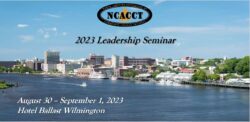
Registration is now open for the 2023 NCACCT Leadership Seminar, to be held Wednesday, August 30 through Friday, September 1 in downtown Wilmington!
Click here for more information.
The following are the materials from the 2023 NCACCT Law-Legislative Seminar in Raleigh:
Open Government and the Community College
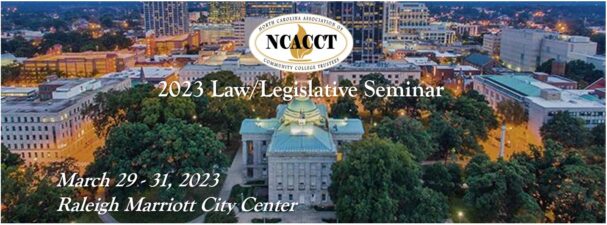
Registration is now open for the NC Community College Day & 2023 NCACCT Leadership Seminar, to be held Wednesday March 29 through Friday March 31 in downtown Raleigh!
Click here for more information.

The annual ACCT Leadership Congress will be held October 26 to 29 in New York City.
For all attending from our state, a special reception for North Carolina registrants will be held on Thursday, October 27, at 4:30 p.m. in the Jolson/Cantor Rooms on the 9th floor of the hotel.
For more information or to register for the Leadership Congress, please click here.
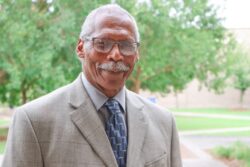
Spotlight on Community College Leaders:
Sampson Community College Chair Dr. Ted Thomas
Dr. Ted Thomas is a man who practices what he preaches, both literally and figuratively. Pastor of First Missionary Baptist Church in Warsaw, North Carolina, Thomas has been a lifelong learner himself. “You are never too old to learn,” he says.
Thomas has been involved with the community colleges on a volunteer basis since 2017, when he began serving on the Sampson Community College (SCC) Board of Trustees. However, his first connection with the community colleges was in 1983 when he moved to Clinton and opened a dental practice. Wanting to get involved with the community, he worked for Sampson Community College (SCC) on a contract basis teaching cardiopulmonary resuscitation (CPR) in the community, traveling to various fire and rescue squads to do so. He also took a few self-improvement courses at SCC.
As a trustee, Thomas has realized the importance of SCC and the community colleges as a whole. He has discovered that “the purpose of the trustee is to make sure the ship is going in the right direction,” he said. “There is work involved when you are a trustee if you want the college to succeed. You don’t want to just occupy a seat.” Part of the success of SCC’s Board of Trustees, says Thomas, is that their trustees do not allow politics to govern their decisions. “We try to do the best for the students and try to be a landmark in the community that we serve,” said Thomas.
Thomas also stresses the importance of new trustees to be involved. “Attend workshops and seminars,” he said. “I learned so much when I was a new trustee at those types of things.” One thing he, himself, was surprised to learn about when he was a new trustee was about funding. He said he kept hearing the acronym “FTE,” but did not know what it meant. (It means full-time equivalent.) He later asked about it and learned that community college funding is based on student enrollment and how many FTEs a school has. “That was an eye opener for me,” says Thomas. FTEs are at the forefront of all community colleges, which is why it is important to have good programs at our schools so students want to attend, said Thomas.
Thomas says community colleges give students the opportunity to get ahead. “The community college has become a lot more than just a place to attend if you don’t want to go to a four-year school,” says Thomas. Personally, Thomas saw this first-hand, when his son attended community college and then had a seamless transition to a four-year college. That is “what really turned on the light for us for what the community colleges can provide.” Community colleges are able to be a bridge to the four-year colleges for those who want to take that path, says Thomas.
For those who do not want to attend a four-year college, Thomas says the community colleges can provide training for important vocations that pay well and that will allow people to provide for their families. A good example of one of these vocations is truck driving. If the truck drivers go on strike, says Thomas, “Your Amazon package would not get there!”
Thomas says the community colleges “should be proud of our mission and our goals that we have. We are a vital part of the education system in North Carolina, and we have to stand up to that.” He says community colleges should not feel separated from the rest of the educational system. They should be proud of what they are able to learn at their community colleges.
In considering the community college system as a whole, Thomas believes that the colleges work well together. However, he says that sometimes colleges seem to be in competition with one another, especially community colleges that neighbor one another. “We must work with the statewide community in order to be as strong as we can,” says Thomas. “It’s always better to work together than against each other.”
Thomas says the challenges SCC faces are the same challenges all other community colleges face—the need for enrollment increases as well as salary increases for staff and faculty. Thomas said he would like to get older adults who may have previously taken classes at SCC back into the classrooms to finish what they have started. He also realizes that Sampson County is a large county, which can create transportation challenges for some. He suggests that SCC partner with the county to help provide transportation for the students. He says we need to ensure we do not lose students to other educational entities.
Thomas is also particularly concerned with the decrease in minority male enrollment at SCC as well as across the state. He says that SCC is looking at this issue and is trying to devise a solution. He thinks the schools need to be more visible in their counties and should consider social media to attract minority males.
Regarding community college faculty and staff pay, Thomas knows some counties are able to provide financial assistance to their community colleges. For that to occur in Sampson County, however, would be an “uphill climb” because of the county’s small tax base. Therefore, he encourages SCC’s trustees to contact legislators and discuss financially supporting community colleges so that colleges can provide the salaries needed to keep their faculty and staff.
At SCC, Thomas is most proud of how well the school works for its students. “We are all family, and families work together,” says Thomas. Thomas says that trustees want feedback from the staff, faculty and students about how they can improve the school. Thomas says that, “Relationships are the key to everything.”
Aside from being a trustee, Thomas maintains a full and active life. A 1975 graduate of North Carolina Central University, Thomas continued his education at Meharry Medical College in Nashville, Tennessee, where he received a degree in Medical Technology. After realizing he did not want to spend the rest of his days in a lab, he planned to take a year off from school. Wise counsel from his mother encouraged him not to take off that year, but instead, continue his education. That prompted him to apply to and complete dental school. After dental school, he served in the Navy for three years as a dental officer stationed at Camp Lejeune. He then moved to Clinton in 1983, where he practiced dentistry until 2019.
Prior to his retirement in dentistry, however, after receiving the call to go into ministry in 2006 and after attending Shaw Divinity School, he became the pastor of First Baptist Missionary Church in Warsaw, where he continues to serve. Living out the phrase, “You’re never too old to learn,” Thomas completed his Master of Arts in Biblical and Theological Studies at Knox Theological Seminary in May 2022. Thomas had no desire to let his learning end there, however. He is now enrolled in the doctoral of ministry program at Regent University at Virginia Beach and should complete that degree in three to four years.
Thomas’s hobbies include walking, racquetball, reading, riding bikes, hiking and chess. A little-known fact about Thomas is that about 20 years ago, he almost reached 300 lbs. He now works out about four to five days a week and is careful about what he eats.
Unsure if this will ever occur, Thomas has an interesting item on his bucket list that relates to a hobby he enjoyed for 18 years—piloting a plane. Thomas says he would love to fly through the eye of a hurricane.
Although Dr. Ted Thomas is quite an accomplished gentleman himself, he said his proudest accomplishment is his family and the tight bond they have. And while he knows his family understood why he was not home more during his two boys’ younger years while he was working to get his dental practice off the ground, he said that would be a portion of his life he would relive if he could.
Thomas is also quite proud of his congregation at First Missionary Baptist Church and being a part of SCC and what the college has done for the community. “Do what is right and don’t do it for personal gain,” says Thomas—a statement he seems to have made his mantra.
The following are the materials from the 2022 NCACCT Leadership Seminar in Asheville:
Financial Considerations Handout
North Carolina’s Political Landscape

CPCC Levine Campus Academic Building Design Workshop Case Study
By: Charity Myers, Marketing Coordinator, Moseley Architects
Moseley Architects had the privilege of partnering with Central Piedmont Community College (CPCC) to provide advanced planning and subsequent design services for the school’s new Levine Campus Academic Building. This new facility was not a simple academic structure meant to serve a single department. Rather, its purpose was to provide a diverse array of spaces for several different student life and academic needs, all housed within a thoughtfully curated facility. This required connectivity and functionality to be at the forefront of architectural considerations. Through our work in the advanced planning stage, our team gained a thorough understanding of how unique these desired features and their related challenges would be. Thus, when given the opportunity to move forward with design services, a primary objective from the beginning was to employ a workshop process through which every voice was heard and properly reflected in the final design.
Casting a Wide Net
Key project features include a new library, classrooms, offices, computer labs, science and healthcare labs, an academic learning center, a math emporium, and a Barnes & Noble bookstore, with multipurpose lounge and collaboration spaces incorporated throughout. Such a complex undertaking with a diverse group of end-users can easily buckle beneath the weight of a chaotic process. This can potentially result in some design goals being met, while others slip through the cracks. To avoid this pitfall, our team utilized a workshop approach that strategically gathered input from all departments to inform design decisions.
In our workshop strategy, we collaborated with two groups that each served a distinct function. First, determined to gain a thorough understanding of each end user’s precise needs, we sourced feedback from a large, diverse group of departmental representatives to learn about their individual questions, concerns, and desires. One of these representatives was Karen Summers, Dean of Health Sciences at CPCC, who advised: “A lot of people were at the table, but everyone had their input at the end of the day. [The team] had the opportunity to hear concerns from all and incorporate them into everything.”
We then filtered that information through a smaller, more focused group of key decision-makers who were ultimately responsible for steering the project in a concentrated manner. By employing this method, all comments were considered in an organized, effective way without creating confusion and undue stress on the client.
Navigating Challenges
While this workshop method creates a foundation of inclusivity and understanding, it is not without obstacles. Our team encountered two specific challenges over the course of this experience with CPCC. First, given the multifaceted nature of the project, it was vital for us to be sensitive to lags in communication. During the initial idea-mining phase, communication was plentiful—but we had to be mindful of including departmental representatives on a consistent basis throughout the duration of the project. This is not always easy when working with a large group but must be prioritized to maintain the same sense of inclusion cultivated in the early stages.
The second challenge and lesson learned was the importance of providing proper technical training for end users upon project completion. The final Levine Campus Academic Building includes state-of-the-art technology and modernized features—it was therefore important to make sure faculty and staff knew how to fully utilize their new resources, especially after their feedback played such a major role in bringing those elements to fruition.
Designing Solutions
Of course, all of this means very little if the completed facility fails to fulfill client needs. To gauge our success in adequately reflecting the vision expressed to us by workshop participants, we recently followed up with a few representatives for feedback that goes beyond first impressions. According to Melissa Vrana, Executive Director, Performance Facilities and Events, “The final product is great and functions as a multipurpose space . . . everything was incorporated well.” Edith McElroy, Associate Vice President of Academic Affairs, echoed this sentiment and expressed that she is satisfied with the final design and appreciated that we “looked for alternatives that would please everybody and foster compromise.”
As reflected in this partnership with CPCC, Moseley Architects recognizes the importance of community colleges and the vital role they play in the fabric of their surrounding communities. With this reality in mind, we are committed to employing methods that will not only meet the practical needs of end users but will benefit the area in which a college resides while serving students, faculty, and staff for years to come. In fulfilling those goals, we hope to further exemplify our dedication to enriching lives, designing solutions, and building trust.
